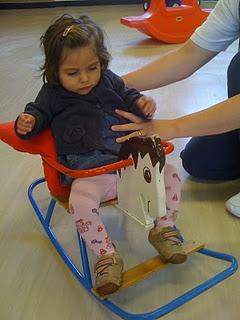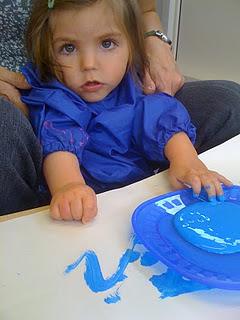 Socialization has been a major concern for a while. The toy library, where Isobel participates in tailored motor skill group exercises, stopped a month ago when its original venue was demolished. Although alternative premises have been found, they won't start again until the New Year due to funding cuts.
Socialization has been a major concern for a while. The toy library, where Isobel participates in tailored motor skill group exercises, stopped a month ago when its original venue was demolished. Although alternative premises have been found, they won't start again until the New Year due to funding cuts. Last September, Explorers - the disabled children's playgroup - at the nearby SureStart children's centre rescheduled its session timings, making it near-impossible for Isobel to attend. She's not open to lunch until their new start time of 12.30pm at the earliest, and she still takes 45-60 minutes to finish eating.
The session is 90 minutes long and 20 minutes' walk away. Getting her to have her lunch there seems pointless. She'd be too busy eating to socialize with the other kids, and anyway, could we run the risk of trying to lipread others at a time when we should be giving her our full attention?
Virtually the only time she gets to meet other children is Stepping Stones on Wednesday mornings and her twice-weekly swim. So when Miles was offered a part-time teaching post, we seized the opportunity to find a mainstream nursery at reduced cost. (Disabled children sometimes get a free nursery place to help offset the costs of their upbringing, which can be as much as three times that of non-disabled children.) Little did I realize what a logistical nightmare it could be.
 By law, all mainstream educational settings must have a SENCO (Special Educational Needs Co-ordinator) in place. The first nursery I selected was on a convenient bus route, and had a strong Ofsted ranking. Their SENCO seemed pretty clued-up, and the whole place had a wonderful bubbly atmosphere, with happy, healthy children and well-presented staff from multicultural backgrounds in every room. They'd even created a sensory room.
By law, all mainstream educational settings must have a SENCO (Special Educational Needs Co-ordinator) in place. The first nursery I selected was on a convenient bus route, and had a strong Ofsted ranking. Their SENCO seemed pretty clued-up, and the whole place had a wonderful bubbly atmosphere, with happy, healthy children and well-presented staff from multicultural backgrounds in every room. They'd even created a sensory room.But there was a problem. The legal adult-to-children ratio was 1:3, and the SENCO didn't have any trained support; the quota was full. Funding - which would otherwise have guaranteed Isobel her free place - was restricted to the three kids already in attendance.
I found two others in town, but one didn't seem particularly welcoming. As for the third...I cannot wipe out the memory of their SENCO, a giant, doughy woman-mountain with greasy hair tightly tied back, throwing a seven-year-old boy into a cupboard of a room with cushions all over the floor and a bare lightbulb. That he was whopping delightedly was beside the point. Ofsted visited them six times in five months last year - and they keep a caged chicken at the fire exit.
I started looking out of Aylesbury. The next nursery was private, so Isobel couldn't get her free place. They seemed a little in the dark about arranging one-to-one support - being inexperienced in working with children with CP - but arranged a meeting regardless with a BSL interpreter as well as a member of Bucks County Council's inclusion team, Isobel's portage worker, Helen - her physio - and me.
That's next week, but they tell me Isobel's place is not guaranteed. They have to explore their available resources.
 If Isobel wasn't given the chance to try a mainstream nursery, I'd be gutted. Not that I have qualms about special-needs nurseries; I know a great place, but I want to see how she gets on in a mainstream setting first. One-to-one support aside, she has great potential, and once in a regular kid-populated environment, I know that her socialization will soar. She already vocalises blithely in mimicry of other speakers in her presence.
If Isobel wasn't given the chance to try a mainstream nursery, I'd be gutted. Not that I have qualms about special-needs nurseries; I know a great place, but I want to see how she gets on in a mainstream setting first. One-to-one support aside, she has great potential, and once in a regular kid-populated environment, I know that her socialization will soar. She already vocalises blithely in mimicry of other speakers in her presence.But all of a sudden last week, our childcare requirements changed. I was invited to a job interview in Birmingham, while Miles had a medical appointment in London the same day as part of the required paperwork for his new post. The employer asked me to confirm my attendance by 5pm that day.
Suddenly, the need for a childminder became paramount. An au pair was out of the question: Isobel needed someone approved with special-needs experience, and I had to find that person by 5pm. Both my sisters lived too far away, and one had just had her first baby. Given the options, I couldn't possibly accept the invitation on the off-chance. I needed to explore the practicalities first.
Asking the employer for flexibility was fruitless. Two of the interviewers were coming from Wales and London, and they'd got a young local volunteer whose school had agreed for him to sit on the panel. (The post involved working with deaf children and young people.) I tweeted about my dilemma, updated my Facebook status, and tried a few professionals including a social worker, the manager of whom was thoroughly uncooperative. My iPhone buzzed all day with suggestions from friends.
At 4.50pm I got an email. Someone from the local Family Information Service had found an available childminder via the Bucks Community Childminders' Network (BCCN), and sent me her full details. She lived just up the road from us, and once worked at Stepping Stones. In an instant, I booked my place. My shoulders had never ached so much.
So for the first time ever, Isobel got to spend a whole day with a stranger in a strange home. An important step towards independence this might have been, but sitting there on the childminder's lap, she still looked tiny and precious as a rare orchid. As I left for my train, I had to keep my eyes skywards, to keep the tears in. Smeared mascara and job interviews don't mix.

